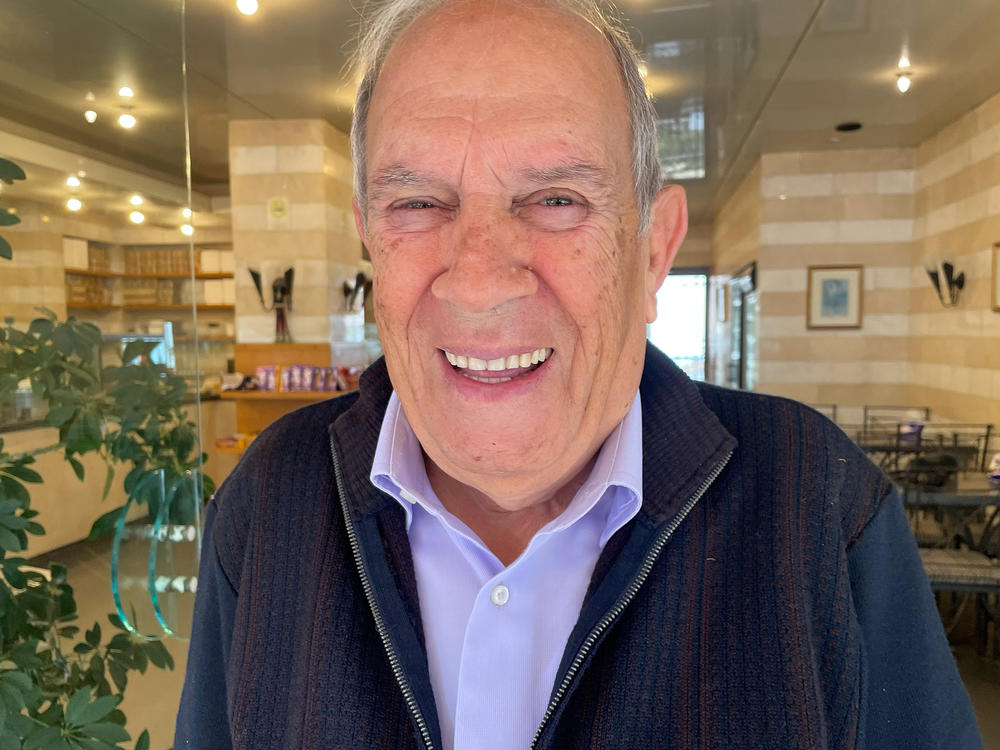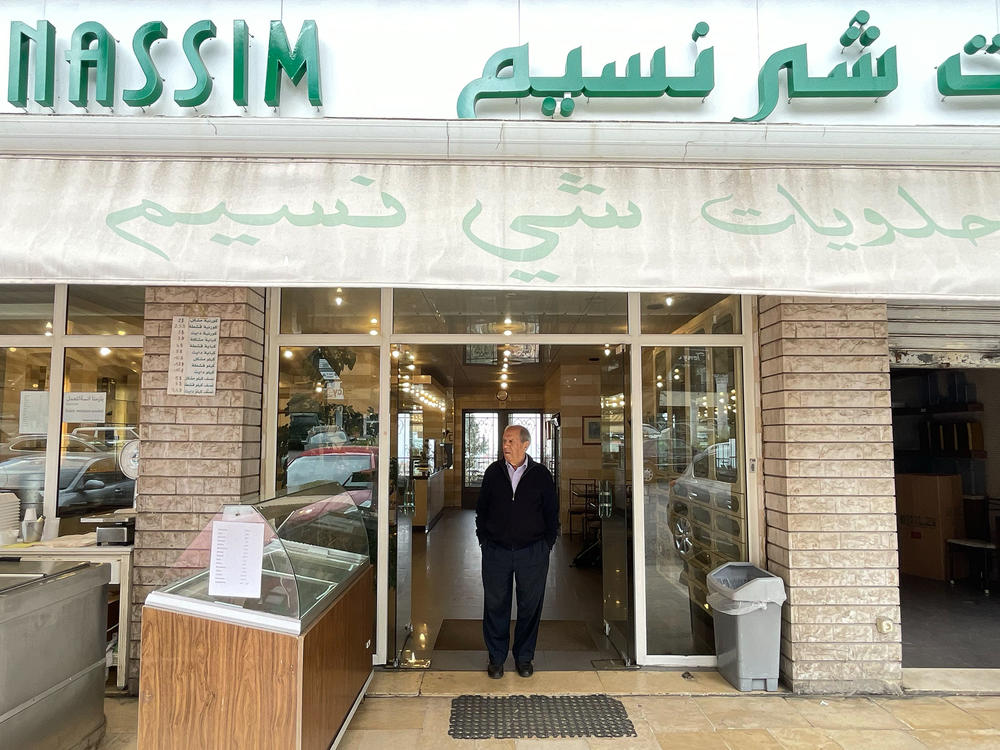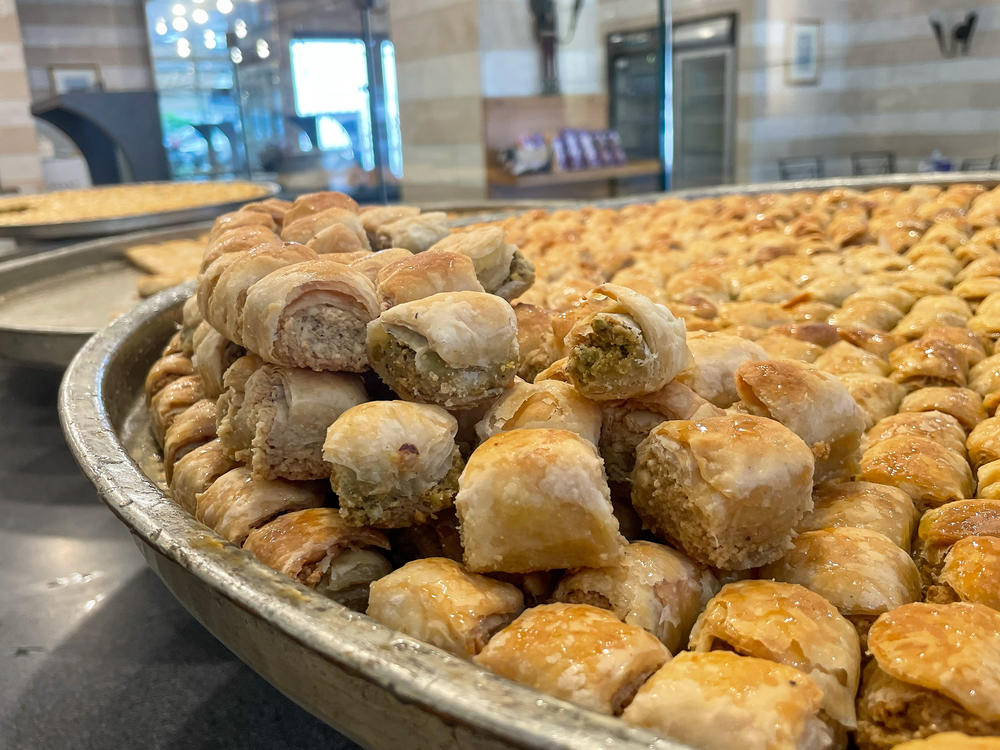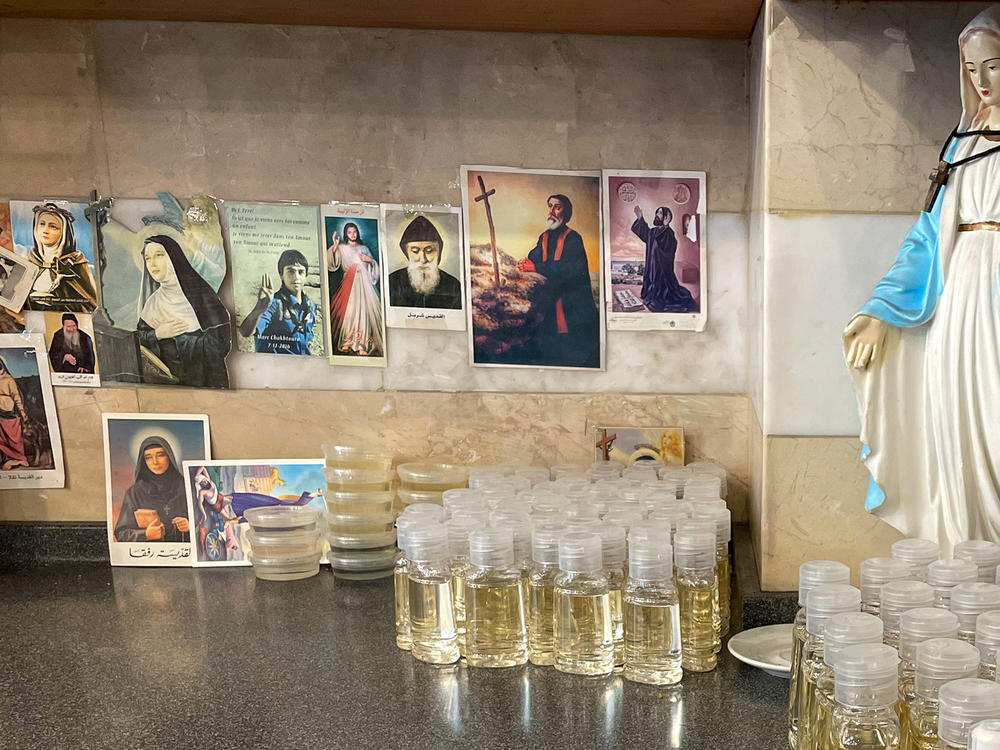Section Branding
Header Content
How to laugh in the face of sorrow: Insights from a Lebanese sweets shop owner
Primary Content
When the civil war broke out in Lebanon in 1975, Nassim Haddad was running three restaurants. One of them, al-Tannour, was on the road to the airport outside of Beirut. A special oven cooked fresh bread right in the middle of the restaurant.
"The people take the bread hot and they eat with labneh, with hummus," says Haddad. "It's good. It's very, very good."
Haddad is my wife's cousin. We've spent time with him since we moved last fall to Lebanon — a country that's a study in opposites. Snow in the mountains and warm water on the beaches on the same day. Lavish birthday parties amid poverty and a currency that's cratered. Stunning alpine beauty and trash on the city streets.
Out of everyone we've visited here, there's something special about Haddad, age 79. I just love being around him. His name — Nassim — means "breeze" in Arabic. It's an apt description for the man. He's light. And refreshing. I marvel at his capacity to float above the decades of turmoil that have rocked his country. It's kind of wondrous, actually.
"Everybody born crying. I was born laughing. I am always laughing," he says, even during the hardest times.
Case in point — early on in the civil war, he drove to al-Tannour with his wife and it was just ... gone. "There is no restaurant, no building, there is nothing," he recalls. He makes a single sound to indicate what had happened — "Boof."
The Lebanese civil war was a broad sectarian conflict that killed tens of thousands and leveled numerous buildings. Haddad's restaurant was one of the casualties. But somehow, he didn't get upset.
When I ask him how he felt, he says, "My wife was crying. I was laughing." It wasn't hysteria, though. Strange as it may seem, he laughed in the face of the disaster. "We do another one," he says. "It's life. Forget it."
Still, it wasn't an easy time. Shortly thereafter, his other restaurants got hit too. His home was burned down.
"Me and my wife and my daughter," Haddad recalls, "we don't have nothing. No car, no house, no work, no money, nothing!"
Haddad stared down all that loss and said to himself, "I start again from the beginning. I start from zero. I [am not] afraid from anything. I can do anything. I am a hero."
Rebuilding with sugar and cream
The first thing Haddad did was to open Chez Nassim, a sweets shop in the Lebanese mountain town of Broummana. At that time, Beirut was divided in half — the eastern, predominantly Christian half and the western, predominantly Muslim half. Most people stayed on one side or the other. But not Haddad, who himself is Christian.
"During the war, every day, I go to Beirut, to the west," he says. He'd buy two pounds of clotted cream and four pounds of batter to assemble qatayef bil ashta, a classic Lebanese sweet made from a small pancake pinched around the cream in the center. Haddad sold the dessert fresh in his shop each day. He made a good living and saved up.
Then, once the war ended in 1990, Haddad used his earnings to open a big restaurant called Place de l'Etoile serving international cuisine. It was located in downtown Beirut next to the Parliament building.
It was among the first restaurants to open in post-war Beirut. "After the war, there's nothing," he recalls. "When I open it, the first minute, I start making money. The restaurant's full."
It was packed with politicians, journalists, ministers and bodyguards. Then, one day, Prime Minister Rafic Hariri walked in and sat down. He wanted to know who'd opened the restaurant. Haddad walked up to him.
"He stand up," Haddad remembers. "He kissing me. Tell me, 'You are a good man. We are repairing Beirut, but you open Beirut. I will come, I will sit here every day.'"
And that's just what he did.
"People come because Hariri's there," explains Haddad. His new restaurant flourished. The years passed. Eventually, Hariri resigned as prime minister and resumed his role as a member of Parliament, all the while continuing to visit Place de l'Etoile. Valentine's Day 2005 was no exception.
"After one hour, he left," Haddad says. "Two, three minute — boom. It was a big explosion."
The windows shattered and the restaurant filled with dust. Haddad soon learned what had happened. "There is no Hariri," he says.
That was the day Hariri was assassinated by a nearby truck bomb ... minutes after finishing a coffee, Haddad says, at his restaurant.
Looking back on that day, Haddad says he felt sad. "I feel Lebanon is finished. I believe after Hariri, nothing left."
But life went on. "We were sad for few days. But after that, khalas," he says, using the Arabic word for "finished." He adds, "We have another president, we have another prime minister. And the life continue. What can we do?"
Haddad sold Place de l'Etoile in 2008 and focused his efforts elsewhere, including Chez Nassim, his sweets shop in the mountains, which by that point had grown from one storefront to three.
Some 40-odd years later, Haddad boasts, "Chez Nassim has become a big name."
Savoring the sweetness
Chez Nassim is where I tend to meet up with Haddad. "Come and have a look," he says as he leads me behind the counter on a spring morning. A fragrance of sugar and rose wafts over me. I could inhale it all day.
We pass sheets of baklava and cookies, and we ogle the ice cream flavors — almond, pistachio, chocolate, lemon, strawberry. Ground green pistachio nuts and red rose petal jam sit waiting to be used as decorative elements atop other desserts. Haddad tells me his offerings — nammoura (a semolina cake), znoud el sit (think crispy cannoli), halawet el jibn (like a cheese blintz), sfouf (a turmeric cake), maamoul (date-filled cookies), and of course qatayef bil ashta (those pancakes wrapped around clotted cream).
At the far end of the shop is a tray of knafeh, a warm cheese between two layers of buttery powdered dough traditionally served in a pocket of bread with syrup. Eat it for breakfast and you're full until dinner.
Haddad eyes me and says, "Every five minutes, I will eat knafeh. Do you want to taste?" I explained that I'd just brushed my teeth. He only became more insistent. "Try it!," he entreats. "Forget about your teeth. Eat."
I pop a chunk of knafeh into my mouth, and it melts. Pure heaven. "Delicious!," exclaims Nassim.
The look of the shop reflects Nassim's dedication to sweets — and his Christian faith. Rows of attar — simple syrup infused with rose water — are tucked into a corner. Well-loved pictures of saints and Christian religious figures crowd that section of the store, clustered around the syrup. Haddad's workers placed the images there.
"We believe [in] them — that's why we work. They help us," he says. "They work with us but they don't take a salary," he adds with his characteristic chuckle.
Remarkably, Haddad has managed to keep paying his employees here throughout Lebanon's constant ups and downs. There was the port explosion in 2020, the pandemic and the wholesale collapse of the banking sector and national currency. "Lebanon go down, and it still go down," Haddad observes. "And we arrive to hell," he says with a laugh.
But Haddad's sweets shop has remained strong... as has he.
"I have my own house, I have my family, we are happy," he reflects. "Yesterday, I drink two bottles of white wine with a good friend. In Lebanon, you don't have tomorrow. Maybe tomorrow will have a war, will have bombs."
And that means, says Haddad, that each day he decides to live every minute fully.
In five words, he summarizes his life philosophy: "You have to be happy."
Copyright 2023 NPR. To see more, visit https://www.npr.org.




